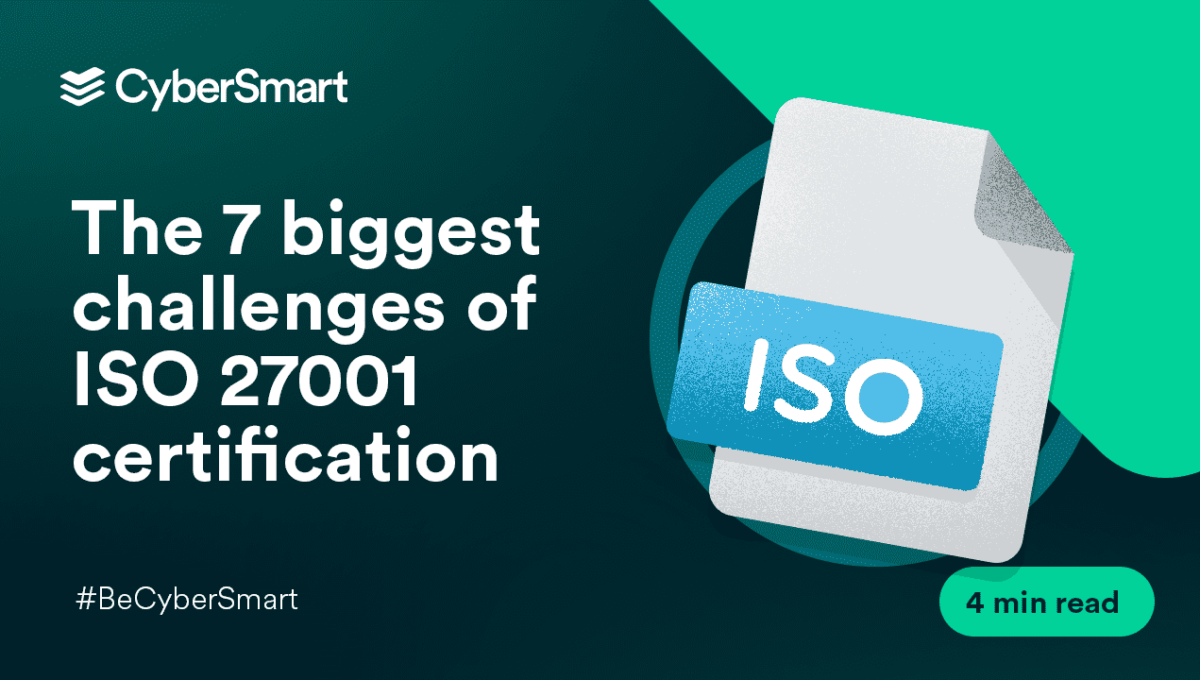It takes months of hard work to meet the rigorous standards outlined by ISO 27001. But if you think it’s the right move for your business, then these are the challenges you should be aware of before starting your journey.
What is ISO 27001?
ISO 27001 is an international information security standard. It was first published by the International Organization for Standardization and the International Electrotechnical Commission in 2005 and revised in 2013.
The standard contains 10 management system clauses and 114 information security controls. These provide businesses with impartial, best-practice guidance on building, deploying, and maintaining a robust information security management system (ISMS). ISO 27001’s guidelines cover all key areas in your business, including people, processes, and tools.
ISO 27001 is more comprehensive than similar security certifications, like Cyber Essentials. It isn’t mandatory for UK SMEs, but there are several benefits:
The benefits of ISO 27001 certification
- Protect your business and customers from cybersecurity threats
- Reassure customers
- Enhance your reputation
- Avoid the financial penalties associated with data breaches
Want to protect your business but unsure where to start? Check out our free guide to cybersecurity certifications in the UK.
7 Common challenges of ISO 27001 certification
1. Understanding the guidelines
ISO 27001 is complex. Annex A of ISO 27001 contains 114 controls. These cover everything from information security protocols to incident management and business continuity. It’s a lot to take in and leaves many businesses asking the question: “where do I start?”
2. Building a security framework
Before embarking on ISO 27001 certification, you should have a robust information security framework in place. This outlines your cybersecurity policies, as well as the processes and tools you use to protect sensitive data from potential threats. It also explains what to do in the event of a security breach.
Auditors assess cybersecurity risks against this framework. If you don’t have one, you’ll have to build it from scratch. This is a significant undertaking and can set your project back by several months.
3. Identifying security gaps
What does your current information security ecosystem look like? It’s a simple question, but unless you review your processes, policies, and tools regularly, it’s difficult to get the complete picture you need to spot potential blind spots in your defences.
This is problematic for two reasons:
- It’s difficult to see where you should focus your efforts
- You might waste time on unnecessary tasks
You wouldn’t be the first business to spend days writing a new bring-your-own-device policy, only to discover you already have one hidden in a rarely used SharePoint folder. A comprehensive gap analysis can provide you with the information you need. But it requires the cooperation and support of every department to make sure nothing falls through the cracks.
4. Establishing responsibilities and ownership
You might think the ISO 27001 certification process is the sole responsibility of the IT department. But that’s not always the case.
ISO 27001 isn’t only about anti-virus software and data protection. It encompasses everything from helping individual team members understand their responsibilities and physical controls to managing supplier risks and compliance.
The COO, operations teams, and HR all have a role to play in helping you achieve ISO 27001 certification.
5. Getting stakeholder buy-in
ISO 27001 certification is a long, intensive, and expensive process. You’ll have to put up with plenty of disruption along the way, and this can be a deal-breaker for some stakeholders. If your business has always worked in a certain way – and succeeded – stakeholders might justifiably ask: “is ISO 27001 worth the hassle?”
Many SMEs wrongly assume that they’re too small to be targeted by hackers, but that simply isn’t the case. 39% of UK businesses reported cyber breaches in 2021 and data suggests they’re on the rise.
You can overcome these objections by building a business case that outlines the value of ISO 27001 certification. This includes the benefits of ISO certification, such as stronger information security processes and enhancing your reputation.
6. Having no project plan
Attempting ISO 27001 certification without a plan is like trying to hit a bullseye while wearing a blindfold. You’ll hit the target eventually, but it’ll take longer and require considerably more effort.
ISO 27001 is a complex and time-consuming process. Successful ISO 27001 certification is a business-wide effort, and that means you need a project roadmap to:
- Split the project into smaller, more manageable steps
- Provide clear timelines for delivery
- Ensure everyone’s on the same page
7. Implementing the project
One of the biggest challenges of ISO 27001 certification is implementing the project. SMEs typically lack the internal skills and knowledge to make the changes required by the ISO.
The key to a successful ISO 27001 implementation is to provide internal teams with the relevant security training, so they can implement the changes with confidence. Alternatively, you could work with a third-party auditor to make sure you’re moving in the right direction.
Is ISO 27001 right for my business?
It depends. Most businesses that embark on ISO 27001 certification are enterprises that have an information security framework in place and are ready to add another layer of protection. They also have the resources to implement the required changes.
For most UK SMEs, ISO 27001 is a nice to have rather than a necessity. Cyber Essentials and Cyber Essentials Plus provide all the security you need to defend your business against the most common cyber threats, like phishing scams and human error.
We certainly wouldn’t recommend attempting ISO 27001 until you’ve completed Cyber Essentials at the very least. Cyber Essentials accreditation isn’t a prerequisite for ISO 27001. But starting with ISO is like trying to run before you can walk.
Still unsure which certification is best for your business? Check out our in-depth guide to cybersecurity certifications in the UK.


